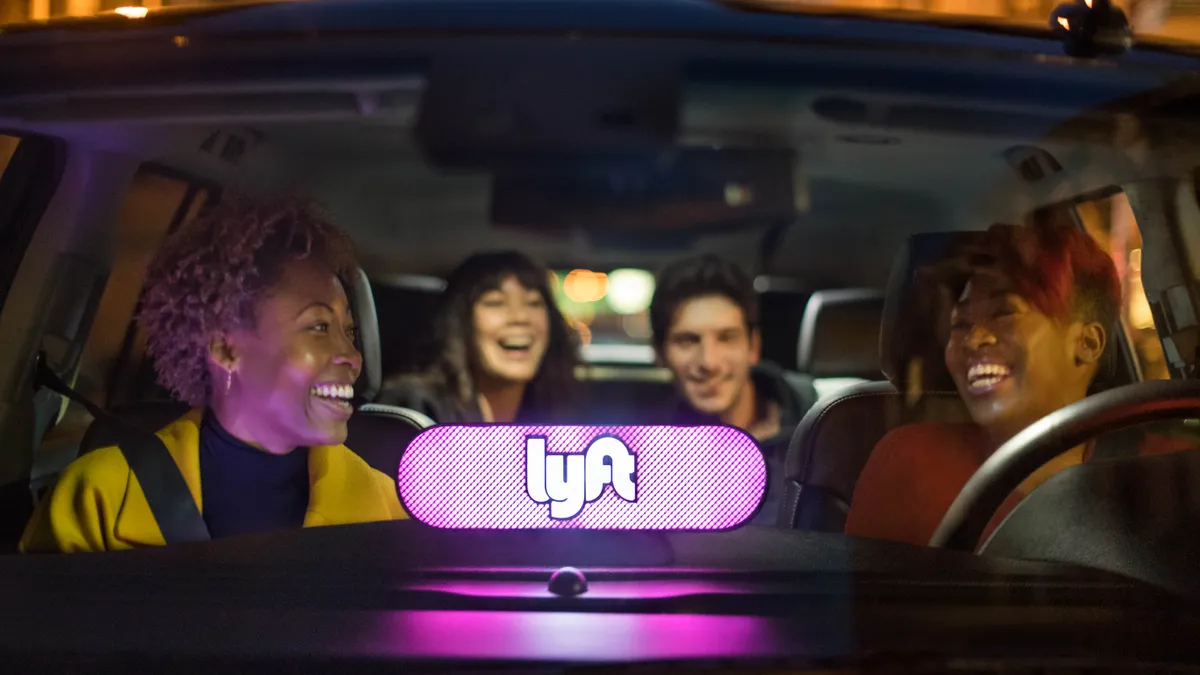Dive Brief:
- Ride-hailing giants Uber and Lyft will keep operating in California after an appeals court stayed a decision the companies must reclassify their drivers as employees, not keep them as independent contractors.
- The companies threatened to suspend service at midnight on Friday, but now instead have until Aug. 25 to file written statements agreeing to the order’s expedited procedures. Uber and Lyft previously argued the regulations under AB5, which assumes workers are employees rather than independent contractors unless they meet strict criteria, would require an overhaul of their entire business model, something the latter said earlier Thursday is "not a switch that can be flipped overnight."
- The companies' fight with the state will continue through November’s election. They and other app-based companies are supporting a ballot initiative, Proposition 22, which the companies say would "protect the ability of app-based rideshare and delivery drivers to work as independent contractors" and preserve the "current on-demand system."
Dive Insight:
This decision marks the latest development in a tortured recent relationship between California and the ride-hailing companies, which have also come under fire in Congress for their labor practices. Lawmakers said AB5 would help drivers in the state earn more money and have benefits and protections like healthcare and the ability to unionize, something that has become more important amid the coronavirus pandemic (COVID-19), during which many have still been driving for gig economy companies.
For its part, Uber recently released a series of priorities for the ride-hailing industry and government that it said would "improve the quality of work for the millions of independent workers who get work through platforms like Uber’s while preserving the flexibility that we know these workers value." The company said it would be willing to contribute towards worker-directed benefit funds, offer more transparency on earnings and garner feedback on drivers' priorities, among other reforms.
In the run-up to Uber and Lyft's threatened withdrawal from California, a bipartisan pair of city mayors urged the court to stay the injunction. San Diego Mayor Kevin Faulconer, R, and San Jose Mayor Sam Liccardo, D, warned in a joint statement of the economic impact of thousands of drivers losing their income, and said there must be more cooperation with the country in the midst of the pandemic.
"Being forced into a situation where shutting down service is the only viable option hurts everyone at a moment when we need to pull together to help more Californians make ends meet," Faulconer and Liccardo said. "We call on all parties to turn this political standoff into a foundation for productive conversation about new ways to preserve a valued service and fairly compensate independent workers."
The two mayors said the "vast majority" of drivers want to stay as independent contractors, and California should create what they called a "portable benefit fund" for independent contractors, paid into by gig economy companies, instead of the rules of AB5.
"The fund would help independent workers save for the future, especially with an equitable benefit accrual structure that ensures an hour of benefits for every hour worked," Faulconer and Liccardo said. "This new stream of income would stay with independent workers throughout their lives, allowing them to invest in health insurance, retirement or any other benefit."
The impacts could have been tremendous, both on riders who have relied on ride-hailing during the pandemic with transit seeing severely curtailed service, and on the thousands of drivers who rely on Uber and Lyft for their income. The Orange County Register reported Uber estimated it would have put 158,000 drivers out of work. In an email, a spokesperson for the California Labor Federation said the threatened withdrawal is part of a broader play to not protect drivers.
"These companies could have simply followed basic labor law to protect their drivers while continuing their service uninterrupted," the spokesperson said. "Instead, they've chosen to play politics with people's lives."
The battle will continue into the fall, with the ride-hailing companies having succeeded in getting Proposition 22 on the ballot and working hard to get it passed, including by urging app users to vote for it. But a July report by The Partnership for Working Families and the National Employment Law Project (NELP) said the measure, if passed, would be "harmful to workers, communities and good government." The groups said the proposition would allow for "broad deregulation" of app-based delivery and transportation, and "eviscerate worker protections."
Nicole Moore, an organizer with California-based drivers' union Rideshare Drivers United and a part-time Lyft driver, said while AB5 is not perfect, it should be tweaked rather than undermined, especially as Prop 22 could hurt the thousands of drivers on the platforms.
"Any time sweeping legislation is passed, there's tweaking that has to happen," Moore said in a previous interview. "And what I've seen is the legislature is continuing to tweak a lot to make it work better for more of the folks impacted by it. That's a continuing process. It will get exactly where it needs to be, because we have some really smart legislators who are working on this quickly to close some of these loopholes."












